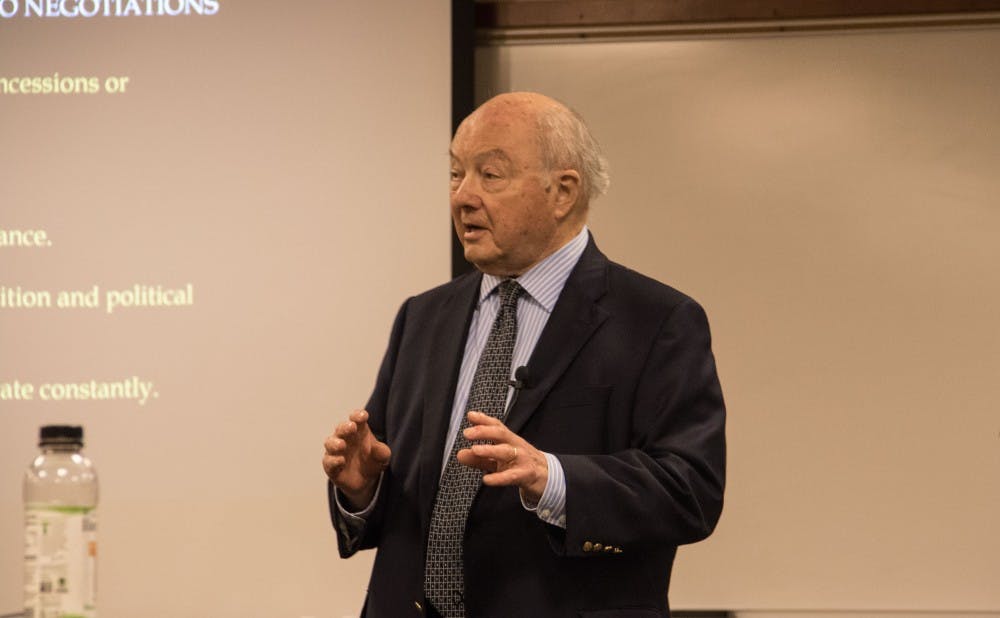Lessons from the Cold War can be applied to today's political climate, former U.S. Ambassador Jack Matlock said at an event Wednesday.
Matlock, a former U.S. ambassador to the Soviet Union and a Rubenstein Fellow at Duke, gave a talk at Perkins Library Wednesday to discuss U.S.-Soviet Union relations throughout the Cold War, contrasting the foreign policies implemented during this period with those put in place by more recent administrations.
“Governments are run by people, and ultimately the interaction of states is the interaction of human beings," Matlock said. "Individual human psychology plays a great role.”
He maintained that the successful navigation and termination of the Cold War largely stemmed from the Reagan administration’s dedication to maintaining open, continuous and respectful dialogue between the United States and the Soviet Union.
This willingness to negotiate respectfully ultimately relieved international tensions surrounding the nuclear arms race, he claimed, and persuaded Soviet leader Mikhail Gorbachev to implement many reforms suggested by the United States.
“Reagan knew how to deal with another human being," Matlock said. "You deal with respect.”
He added that this ultimately led the Soviet Union in a more democratic direction. Had America forgone negotiation and instead attempted to strong-arm the foe into such reform, he claimed, the United States and Soviet Union would still be at war.
Matlock contrasted this measured approach with those introduced by more recent administrations, which dehumanize the Russian population and close off—rather than encourage—dialogue between U.S. and Russian leaders.
“[Dictators] are not kept in office and are not going to be brought down by our public criticism," Matlock said. "By making an enemy of a dictator, you allow that leader to tighten his hold on that country.”
Matlock emphasized that such tactics are futile if one wishes to maintain or regain peace. He argued that, when dealing with dictators, attempting to force change in their nations is almost universally fruitless and is likely to escalate already hostile situations.
Matlock’s conversation coincides with the current debate surrounding the tone U.S. diplomats should take when dealing with foreign leaders such as Russian President Vladimir Putin and North Korean leader Kim Jong Un.
Despite his disapproval of many of President Donald Trump's policies, Matlock did say that he agrees with Trump's approach with dictators. Negotiation is the only way to get back into cooperation with Russia and defuse tensions between North and South Korea, he explained.
However, he also stated that the benefits that might result from these instincts will likely be undercut by the many shortcomings of the Trump administration.
Finally, Matlock asserted that America must become more open to criticism from other nations, expressing concern over the refusal of recent administrations to accept reforms proposed by foreign powers.
"The U.S. is now seen by the majority of people in many countries as the greatest threat to the peace," Matlock said. "We are constantly making judgments on everybody else, but not allowing others to make judgments on us.”
First-year Ash Jhaveri mentioned that he appreciated the former ambassador's talk.
"Mikhail Gorbachev was just as responsible, if not more responsible [than the United States] for the Soviet Union’s breakdown and reforms because he was willing to make reform, whereas nowadays we don’t see much willingness to [reform] from either side," Jhaveri said.
Sophomore Suchir Blatt disagreed that the political strategy of respectful negotiation could be maintained.
“It would be great if they could be," Bhatt said. "I think it would be interesting trying to apply that to Kim Jong Un. I don’t know if anyone could analyze his mindset the same way we could with Gorbachev. That would be really interesting to see. But will that happen? Definitely not.”
Get The Chronicle straight to your inbox
Signup for our weekly newsletter. Cancel at any time.

